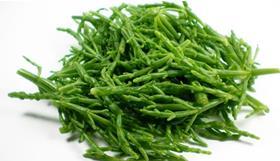
Scientists at the International Centre for Biosaline Agriculture (ICBA) have successfully started growing halophytic, or salt-loving, vegetables in UAE conditions, according to a report from Arabian Business.
This is the first time that halophytic vegetables have been grown in the UAE without employing fresh water, instead using reject brine from desalination units treated with fish effluents.
The aim of the research is to conserve fresh water by introducing such vegetables into the local diet, contributing towards the sustainable food security of the country.
As part of a pilot study at its Dubai experimental station, ICBA is growing six halophytic vegetables: salsola soda (agretti), crithmum maritimum (rock samphire), beta maritima (sea beet), aster tripolium (sea aster), salicornia bigelovii (samphire), and portulaca oleracea (common purslane).
ICBA agronomist Dr Dionysia Angeliki Lyra, who is leading the research, commented: “We are very happy to grow halophytic vegetables in the UAE conditions and the initial results are very promising. In addition to saving fresh water and utilising reject brine for vegetable production in the country, our focus on halophytic vegetables is based on the scientific studies, which demonstrate that these vegetables are very rich in antioxidants, fatty acids, vitamins and other vital elements essential for human health.”
The idea behind the project is for halophytic crops to be cultivated in degraded or barren lands in the UAE, producing economic benefits for local communities.
According to the ICBA, the ultimate aim is to develop “climate-resilient, bio-diverse, affordable, easy-to-operate, nutrient-dense farming schemes that increase food and nutrition security in salt-affected areas, desert environments and marginal lands, while providing multifold incomes to farmers”.
The Centre also revealed that it was working with UAE-based chef Doxis Bekris to come up with recipes involving halophytic vegetables.



